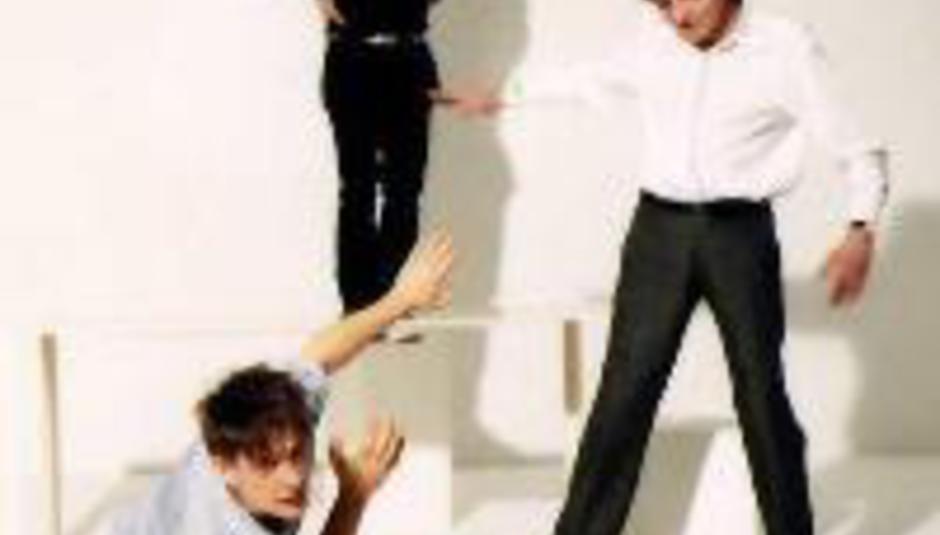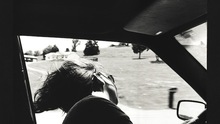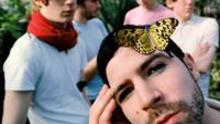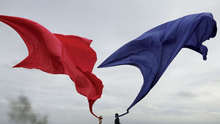Hold onto your headphones because if music’s boundaries weren’t already severely pushed by Mouse on Mars’ hybridized electronic sound then they’ve just got a whole lot more blurred with their new project, a collaboration with The Fall frontman Mark E. Smith. It’s called Von Südenfed and their new album, Tromatic Reflexxions, is more complex than you’d think (read the DiS review here). A messed up disco record with glitch beats and cut-up adventures into identity crisis, the record’s the product of an odd pairing, for sure. But as DiS’s Richard MacFarlane discovers after speaking to MoM’s Jan St Werner, there’s a lot more hidden beneath the long-player’s surface.
Richard MacFarlane: How did the whole project come about?
Jan St Werner: I don't really know how we started, it just happened. There was interest from both sides to do something that we both hadn’t done yet, be that as The Fall or Mouse on Mars. The project actually started when we really deliberately agreed on giving it its own name, not Mouse on Mars feat. Mark E Smith, or The Fall being messed up; we intended to give it its own space. The first meeting was at a gig of MoM in London – Mark came to see the show and liked, it so we stayed in touch. He came to the studio at some point and new recorded a session that we used as a basic material for the album.
So, it’s a very separate entity: was it an equal exchange during the record’s creation?
Yeah, well, there’s no other way. Mark is not someone whom you can just give a track and just say, “Do it this way.” I mean, you could, but the result would be very different. The interesting thing about this was that it involved all three of us – each one contributed his own ideas in his own way. We all have different ways of contributing. Mark, as a ‘non-musician’, he was like: “I’m not a musician, you are, you can do this, and you can do that.” But that, that’s his trick. That’s his magic.
Would it be fair to say he calls himself an ‘anti-musician’?
Hmm, I’m not sure if he’s an anti-musician; it’s just that he’s not a musician. It gives him this outside perspective in judging things in a different way which I think is really important because if you are a musician you usually get caught up in being a virtuous or whatever, just being that person with that instrument or that melodic scale in mind. Not being a musician gave Mark a certain freedom to decide things in a different way – they still turn out musically, but they’re just not decided from a purely musical point of view. I think that’s a very good twist that he had on the whole project.
It’s funny how suitable his voice sounds on top of your glitchy and sometimes quite harsh beats. I found it similar to The Fall in a way, rollicking and running along. Had you listened to The Fall very much?
No, I hadn’t listened to The Fall at all, really. I think maybe The Fall just comes through in Von Südenfed because he is The Fall, and his voice is so associated with it. It’s such a strong trademark, and then just his way of doing things… it sticks out. And because these tracks are not so much stop and go, or as complex and twisted as Mouse on Mars’ songs usually would be, it’s more similar to The Fall.
Yeah, they’re a lot easier to nod your head to, or maybe even dance to, than other MoM tracks. I was wondering if you had the dancefloor in mind when making these Von Südenfed tracks?
Yeah, for sure. We wanted to do something that would work on the dancefloor. We actually decided that the dancefloor would be the platform, or the surface, on which we wanted to do the Von Südenfed thing. I think any other area would’ve been either closer to The Fall or to Mouse on Mars. We wanted to do something musically extreme to us, and something we hadn’t done before. Even if there are qualities from both The Fall and MoM that do come through a bit, we wanted to focus more towards the dancefloor and make an almost disco record, you know. I mean, not too steady beats, always something that’s a bit shuffled and swinging, and for it to come together in a more bouncy way. I know what you mean with The Fall, but I think there is one element that The Fall doesn’t really have, which is like a certain funky precision that Von Südenfed has. Which is good, and I think maybe the secret of The Fall is that it’s never been too tight; it’s sort of ramshackle, and really just falling together. Von Südenfed is tighter, and that’s something that Mouse on Mars never really achieved because we would always go a bit loose and try to find open gaps and ways to twist the whole thing again, and within a song change the whole direction completely. So we thought we did something we’d never really achieved before, and a lot of it came through Mark’s influence I think. I mean, Mark definitely didn’t say stuff like, “Hey, let's make it more funky!”, or, “You have to make it tighter!”. But his presence made the songs become tighter, and on the spot and more funky, even if he didn’t want that exactly.
His voice, in terms of this, it works in different ways: sometimes blurring in and out of the music, getting louder and quieter, and sometimes riding on top of the music, sometimes driving it…
Yeah, he very much influenced the rhythm and the tempo and structure of the tracks. For instance, on ‘Fledermaus Can’t Get Enough’ his voice is really upping the tempo and the dynamics of this song. He’s still on top of it, that’s just the way he is. The way he puts his voice on top, it’s like he’s rooting himself at the bottom or at the center of the music. That’s what makes it interesting for me: he’s listening to the stuff very carefully but then he’s not minutely or perfectly putting himself where he's supposed to be. He's almost sabotaging it with his own way of singing. He's creating a real tension, and I think that’s something that most singers are afraid of doing – most try to do their job well. That’s something we didn’t like about music with vocals, but that’s why we were comfortable here: it still seems like the music has a lot of space and can shift in different directions. The vocals come really like an MC, and they sort of explain the sound.
‘Fledermaus Can’t Get Enough’ video
---
Yeah, that idea of the MC, it seems really apt for the way he sounds. He’s like this really ridiculous, self-deprecating sort of MC, sometimes tearing the music apart, sometimes pushing it really far forwards. He’s rambling over top sometimes and humoring himself as he goes along…
Yeah, he has a lot of humour and is making fun of everything, himself included. Like on ‘Family Feud’, he’s singing about himself in multiple identities. He has a good way of sabotaging himself.
And on ‘Flooded’, he’s talking about being the DJ in a quite ironic and sardonic way, talking about flooding the club. What’s that song about?
It’s kind of funny: he’s translating this dream I had. In the dream, I had to book the whole club because I am such a lousy DJ; I had to buy the whole club out for that night. So I’m arriving there with all my records, glad that I can finally play all these great tunes that I have invested all my money into. And I get there, and there is already a DJ, the in-house DJ. He’s like, “You might’ve booked the club but I’m the DJ, I’m putting on the records”. And then, I’m going so insane that I flood the club, flushing the whole thing away. Mark liked the dream so much that he put down lyrics straight away. With him, he thought also of the connotations of having a dream and something going really wrong and you piss your bed, in this Freudian way. There’s this reverse personality on the track, which is a recurring theme of the record – who is actually who? Like, I’m the narrator, and also the band member, then he’s Mark E. Smith, then he becomes me, then he’s the DJ, then the DJ’s pissing in his own bed. It’s like the album title: everything is reflecting upon everything, mirroring itself. Personalities are changing, the hierarchies of the band are changing, all these things are creating a tension that makes the record go so insane, and perspectives are constantly shifting. On the record art, it’s a play on the image of the band: it’s us three on the front cover but on the inside it’s got these three transvestites, and you’re unsure whether it’s the band dressed up as transvestites or what.
Yeah, it’s funny because right now on the computer screen the YouTube video for ‘Fledermaus Can’t Get Enough’ is playing and there’s this guy dressed up in a woman’s evening dress. In some strange way that seems to me how the whole record sounds…
Yeah, it’s this thing of changing personalities, changing your look, and then miming something as well but not perfectly imitating something, because in the end you always imitate yourself. All this is a theme running through the record. Also on the album sleeve there are these three young black musicians, the stereotype of this bad Dixie black band, the stand-up bass and the trumpet player. It’s all hidden in the record, questions of identity, and I think it’s quite cool; it’s always like, “Who is this band, what are they actually really doing?” It’s also a piss take of all these serious bands that suddenly show up with guitars and drums and they’re like, “We’re an authentic band,” and an authentic band has to be bass, drums guitar… it’s so pretentious, and so stupid. It’s as pretentious as Kraftwerk claiming that in the year 2000 every band will be electronic and we’ll all stand like robots. It’s this irony that is also in Von Südenfed: what really is a band and what’s really authentic? And why you want all these surfaces if it’s the music that counts in the end.
Tromatic Reflexxions is out now on Domino. For more on the band click here for their MySpace site.


















